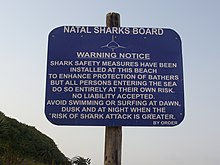The KwaZulu-Natal Sharks Board (KZNSB), previously the Natal Sharks Board and Natal Anti-Shark Measures Board is an organisation that maintains a "shark control" program (using shark nets and drum lines) off the coast of KwaZulu-Natal Province, South Africa, at 37 places.[1] The purpose of the nets and drum lines is to reduce the number of shark attacks. It was founded as a statutory body in 1962, when the city of Durban's netting operations were extended to other parts of the coast in the then Natal Province.[2][3] It is headquartered in uMhlanga, north of Durban.

The KwaZulu-Natal Sharks Board displays sharks that they have killed as part of shows.[4][5]
The "shark control" program that the KwaZulu-Natal Sharks Board (KZNSB) operates has been called a shark cull.[6] In a 30-year period, more than 33,000 sharks have been killed in the KZNSB's shark-killing program — during the same 30-year period, 2,211 turtles, 8,448 rays, and 2,310 dolphins were killed.[6] Although shark species such as the great white shark are protected in South Africa, the KZNSB is allowed to kill these sharks (an exception was made for them).[6] The KZNSB has installed shark nets in Marine Protected Areas, and those nets kill animals.[6] The current KZNSB "shark control" program has been criticized by environmentalists, and has been called "archaic" and "disastrous to the ecosystem".[6][7] Jane Williamson, an associate professor in marine ecology at Macquarie University, says "There is no scientific support for the concept that culling sharks in a particular area will lead to a decrease in shark attacks and increase ocean safety."[8]